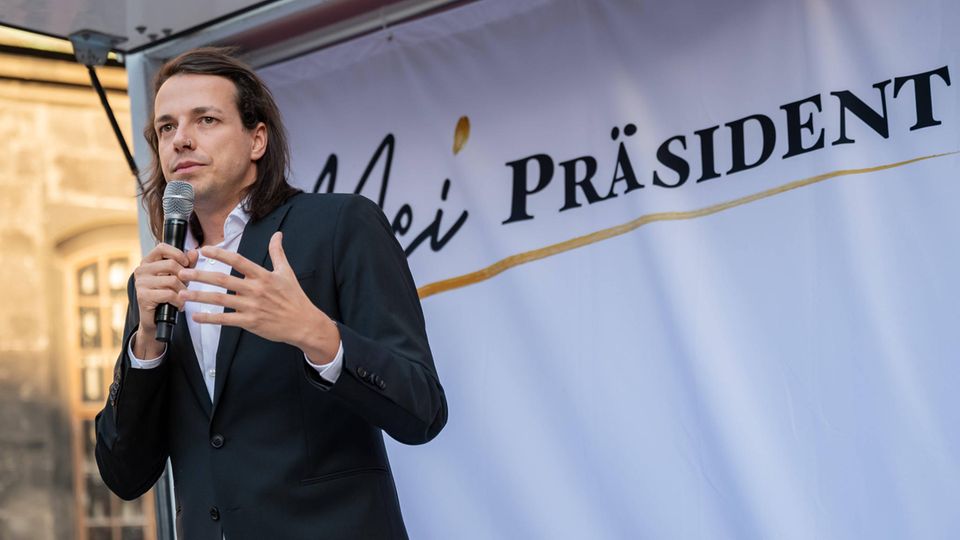The satirical beer party wants to enter the Austrian parliament. Your chances of doing so are not bad. But the parliamentarians don’t have to be prepared for a beer tent atmosphere between the benches.
Some people might think it’s a crazy idea. A party called Bier wants to enter the Austrian National Council: “Yes, the Beer Party wants to enter parliament,” said party leader Dominik Wlazny a week ago.
The politician is serious. If the appropriate financing for the beer party and its election campaign can be secured, “we will do everything we can to get into the National Council.” The aim is to gain 20,000 members or appropriate financial support by the end of April. “We now need support from all corners of Austria. Anyone who wants to see the Beer Party in the National Council has it in their hands,” Wlazny appealed to his compatriots. But the party leader doesn’t want major donors. “The Beer Party is independent, fresh, free of self-interest.”
The annual membership fee for the beer party costs 59 euros. With 20,000 memberships, this results in a total financial cushion of 1.18 million euros. This is a great way to campaign – or drink a lot of beer.
A song becomes the reason for the beer party
It was a song that led to the founding of the Fun Party. In 2014, the doctor Wlazny decided to use the electric guitar instead of the stethoscope – and became the singer, guitarist and songwriter for the punk rock band “Turbobier” under the alter ego “Dr. Marco Pogo”.
In 2015, the punkers released the song “Bierpartei” and shot a music video for it. An election poster was needed for this. And if you already have that, why not start a party, Wlazny thought. Said and done. “You have to make things easy. It can’t be that difficult to register a party, I thought to myself,” he told the Austrian portal “News”. The Austrian Beer Party (BPÖ) was born. In one “News” interview the party founder made it clear that Marco Pogo was the punk and Dominik Wlazny was the politician.
Four years after their founding, the beer party members celebrated their first, albeit very small, success. In 2019, the party ran for the National Council election, but only in Vienna. She won 0.1 percent of the votes. However, she missed out on entering parliament.
Dominik Wlazky wanted to become Federal President
A year later, the party, which now only calls itself the Beer Party, ran in the Vienna city council elections with slogans such as “Make Vienna tight again” or “Where there is a will, there is a per mille”. The main election promise was to convert Vienna’s Hochstrahlbrunnen into a beer fountain. This was well received by around 1.8 percent of voters, beer politicians moved into eleven district councils, including party leader Wlazny.
But the fun party is not just about hops, malt, foam and alcohol. This shows that the Beer Party takes its work in the Vienna district councils seriously several applicationsthat MPs have put forward in recent years. It’s about children’s rights, free period products, publicly heated rooms or public bookcases for the Viennese population. In between, however, there are also less serious applications: in 2021, the party wanted to implement its election promise about the beer fountain. The reason given was that this acts as a “social and cultural contact point that increases the quality of life of all residents.”

Dominik Wlazny at a campaign event for the office of Federal President
© SEPA.Media / Imago Images
But Wlazky wanted more. In 2022 he ran for the office of Federal President. With “My President” and “Talk to me about it!” he campaigned, this time very seriously. The punk rocker criticized low pensions, child poverty and too little commitment to the energy transition. Wlazny managed to get 8.3 percent of the vote and thus came third. A remarkable result. However, former Green Party politician Alexander Van der Bellen won and was confirmed in office for another six years.
Potential for the beer party
The beer party’s party program also revolves less around hops. The party summarizes its demands under the umbrella of equal opportunities and everyday life. It wants to actively combat child and family poverty, increase affordable housing, educational equality, expand public transport, implement the Paris climate goals, promote research and combat violence against women. There is still little concrete information about how exactly this will all be implemented.

But there are program items that the Social Democrats, the communist KPÖ and the Greens also represent, like the newspaper “Standard” remarked.
Observers see potential for the Beer Party on the left party spectrum. The political scientist Thomas Hofer said this “Default”: “This is of course not good news for these parties.” This refers to the social democratic SPÖ, the KPÖ and the Greens. It could be particularly painful for the Social Democrats if the beerists go into the election campaign and siphon off votes. But protest voters and people who are dissatisfied with politics could also help the beer party. “The Beer Party would be a new player alongside the established parties that would particularly appeal to younger people.”
Criticism of the Beer Party for a lack of participation
In the meantime, surveys even suggested a landslide victory: in 2022, the party was polled at around ten percent, even ahead of the Greens. But the party has now fallen in favor with voters. In the December polls, the Beer Party fell to around three percent. To get into the Vienna National Council, she would need four percent to overcome the hurdle. But that doesn’t really matter to Wlazny. According to his own statements, he doesn’t read surveys.
But it takes more than the self-imposed goal of 20,000 members. In order to be able to run in the parliamentary elections, either three members of the National Council must sign the election proposal – which is loud “Courier” is considered rather unlikely. The alternative: declarations of support from the population. 2,600 are needed for a National Council election proposal.
This could happen quickly. One day after announcing its intention to run, the Beer Party announced: “In the first 24 hours after the press conference, the Beer Party welcomed 2,216 new members.” If this number and the existing members – according to party leader Pogo there should be 1,300 – sign the declaration of support, nothing will stand in the way of an election campaign.
But there is a problem – and it is internal to the party. Experts say that party members’ co-determination rights are very limited. “The question is: Do they get a say or are they only allowed to pay? At the moment they don’t have much say,” said political scientist Laurenz Ennser-DENASTIK to the Austrian magazine “Profile”. The statutes currently stipulate that Wlazny can decide almost everything on his own.
“This will shake up the political structure”
The party leader is elected by a general meeting. However, only the four-member board is allowed to submit applications. In addition to Dr. Pogo himself includes his father, a cashier and a secretary. “In the event of a tie, the vote of the chairman decides,” says the beer party’s statutes. That sounds more like harsh autocracy. Or: “If the board controls everything, the tendency towards oligarchy is obvious,” says Ennser-DENASTIK.
Nevertheless, the other parties in Austria should wrap up warmly and think about how to deal with the beer party. Pollster Peter Hajek told broadcaster Ö1 that forming a government with beer parliamentarians in the National Council would be more difficult. His colleague Wolfgang Bachmayer sees it the same way he does “Courier” said. “This will shake up the political structure.” Whether this actually happens will become clear in the fall of this year. Then the National Council elections are coming up.
Sources: Press releases from theBeer party, Beer Party homepage, myparliamentary.at, City vienna, “Courier”, “News”, “Default”, APA news agency, ORF, “Profile”

